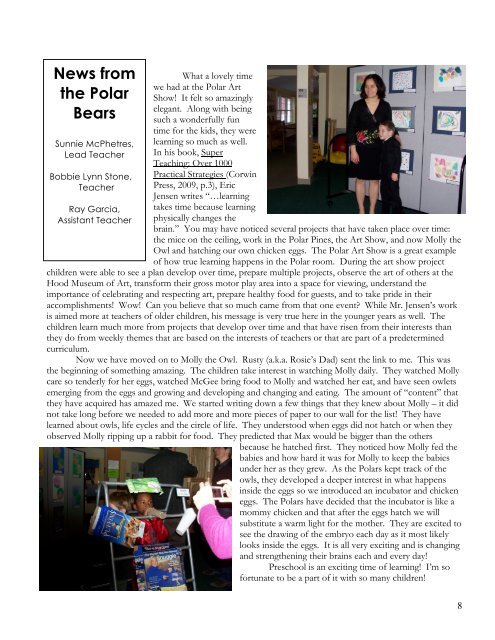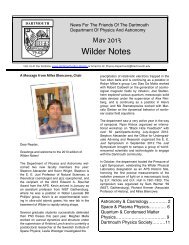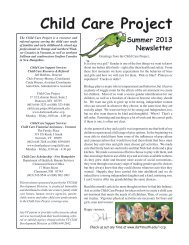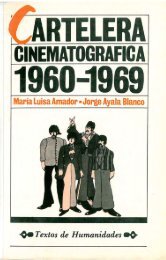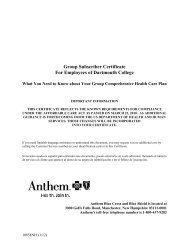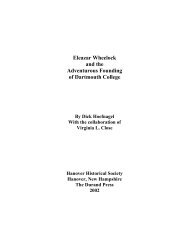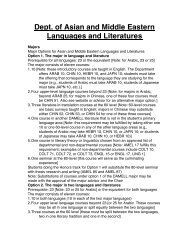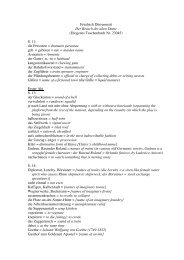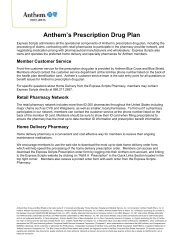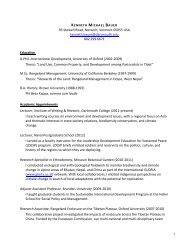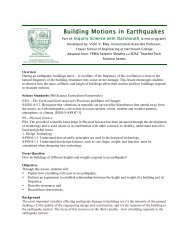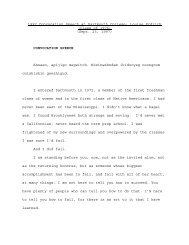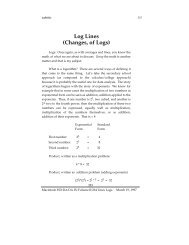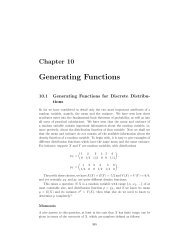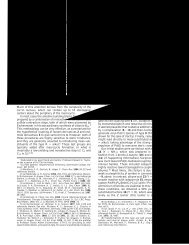Dartmouth College Child Care Center Newsletter
Dartmouth College Child Care Center Newsletter
Dartmouth College Child Care Center Newsletter
Create successful ePaper yourself
Turn your PDF publications into a flip-book with our unique Google optimized e-Paper software.
News from<br />
the Polar<br />
Bears<br />
Sunnie McPhetres,<br />
Lead Teacher<br />
Bobbie Lynn Stone,<br />
Teacher<br />
Ray Garcia,<br />
Assistant Teacher<br />
What a lovely time<br />
we had at the Polar Art<br />
Show! It felt so amazingly<br />
elegant. Along with being<br />
such a wonderfully fun<br />
time for the kids, they were<br />
learning so much as well.<br />
In his book, Super<br />
Teaching: Over 1000<br />
Practical Strategies (Corwin<br />
Press, 2009, p.3), Eric<br />
Jensen writes “…learning<br />
takes time because learning<br />
physically changes the<br />
brain.” You may have noticed several projects that have taken place over time:<br />
the mice on the ceiling, work in the Polar Pines, the Art Show, and now Molly the<br />
Owl and hatching our own chicken eggs. The Polar Art Show is a great example<br />
of how true learning happens in the Polar room. During the art show project<br />
children were able to see a plan develop over time, prepare multiple projects, observe the art of others at the<br />
Hood Museum of Art, transform their gross motor play area into a space for viewing, understand the<br />
importance of celebrating and respecting art, prepare healthy food for guests, and to take pride in their<br />
accomplishments! Wow! Can you believe that so much came from that one event? While Mr. Jensen’s work<br />
is aimed more at teachers of older children, his message is very true here in the younger years as well. The<br />
children learn much more from projects that develop over time and that have risen from their interests than<br />
they do from weekly themes that are based on the interests of teachers or that are part of a predetermined<br />
curriculum.<br />
Now we have moved on to Molly the Owl. Rusty (a.k.a. Rosie’s Dad) sent the link to me. This was<br />
the beginning of something amazing. The children take interest in watching Molly daily. They watched Molly<br />
care so tenderly for her eggs, watched McGee bring food to Molly and watched her eat, and have seen owlets<br />
emerging from the eggs and growing and developing and changing and eating. The amount of “content” that<br />
they have acquired has amazed me. We started writing down a few things that they knew about Molly – it did<br />
not take long before we needed to add more and more pieces of paper to our wall for the list! They have<br />
learned about owls, life cycles and the circle of life. They understood when eggs did not hatch or when they<br />
observed Molly ripping up a rabbit for food. They predicted that Max would be bigger than the others<br />
because he hatched first. They noticed how Molly fed the<br />
babies and how hard it was for Molly to keep the babies<br />
under her as they grew. As the Polars kept track of the<br />
owls, they developed a deeper interest in what happens<br />
inside the eggs so we introduced an incubator and chicken<br />
eggs. The Polars have decided that the incubator is like a<br />
mommy chicken and that after the eggs hatch we will<br />
substitute a warm light for the mother. They are excited to<br />
see the drawing of the embryo each day as it most likely<br />
looks inside the eggs. It is all very exciting and is changing<br />
and strengthening their brains each and every day!<br />
Preschool is an exciting time of learning! I’m so<br />
fortunate to be a part of it with so many children!<br />
8


